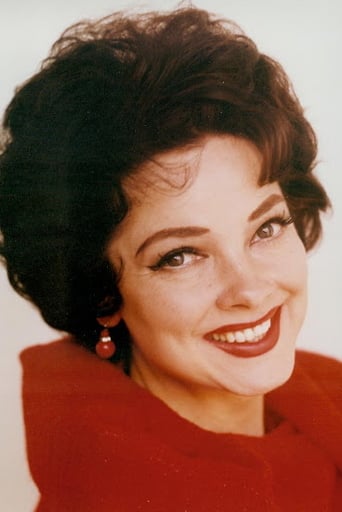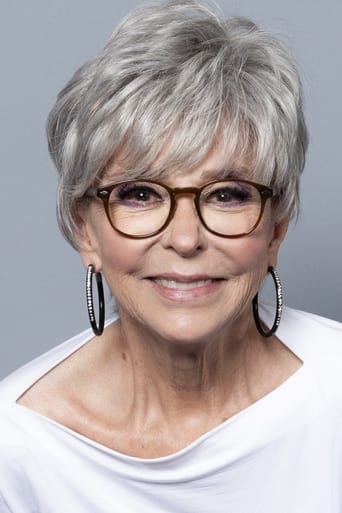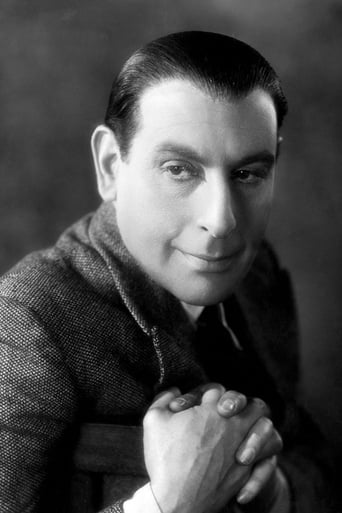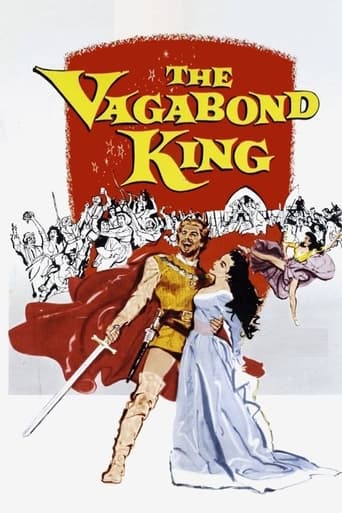
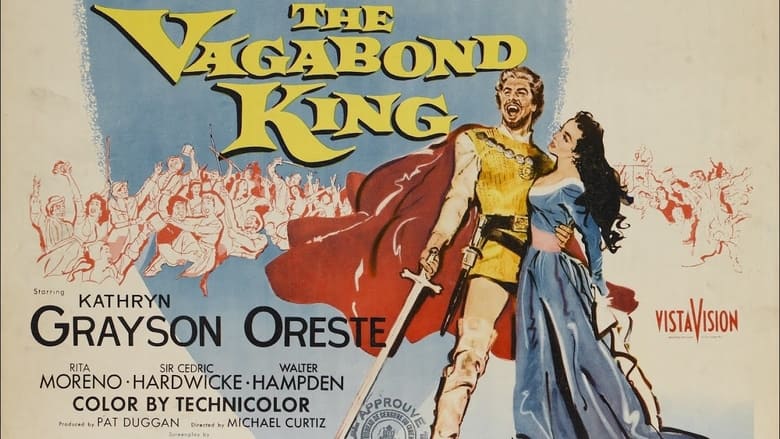
The Vagabond King (1956)
Louis XI of France drafts Paris's popular "king" of criminals as Provost Marshal in his fight against usurper Charles of Burgundy and the traitorous nobles who rally around him.
Watch Trailer
Cast


Reviews
This story of 15th century France is based on the 1925 operetta of the same name which, in turn, is based upon the 1901 romantic novel and play "If I Were King". There was a 1930 musical film version by the same title,starring Denis King and Jeanette MacDonald, which I haven't seen. There was also a 1937 non-musical version entitled "If I were King"Kathryn Grayson(as Catherine) technically was the lead female. However, her screen time was limited, mostly devoted to solos or duets with Oreste Kirkop, as Villon: the vagabond king. The younger Rita Moreno, as Hugette, a lively tavern girl, also in love with Villion, also had several songs, and danced for or with the patrons on several occasions. She was much more involved in the doings of the rabble that Villion led, and with aiding Villion when in trouble. In contrast, Catherine was of noble birth and much less animated.Historically, this much is true: There was a long standing conflict between the province of Burgundy and the French crown, Burgundy being nearly autonomous of France. Duke Charles did head Burgundy during the relevant time of the reign of Louis XI. Francois Villon was a well known poet and suspected occasional thief during this time. However, I found no information suggesting he was the leader of a dissident group of Parisians. Indeed, Louis XI seems not to have problems with rebellion. As suggested in the film, he was rather low key, dressing simply and spending much time traveling around the countryside, interacting with the common people. He initiated a system of postal roads, thus much facilitating the communications and transportation throughout France. However, the remainder of the story is purely fictional. Charles of Burgundy wasn't killed as depicted. He was killed in a foolish war with Switzerland. This effectively ended Burgundy as a separate power from the French crown.Through most of the story, the common people of Paris were opposed to Louis, apparently because their rations were too meager, and were prepared to join with Duke Charles in deposing Louis. However, Villon, their leader, decides to take the King's offer of becoming the temporary provost marshal, until Duke Charles was subdued; thereafter being hung as a thief. Villon eventually persuades the common people to support him in a surprise attack on Duke Charles' forces when he attacks the city. Instead of closing the city gates, Villon orders that they be opened, as Charles expected. Then, the combined forces of the common people and Louis's troops would hopefully crush the Duke's forces in the narrow streets.Although this was Oreste's only feature length Hollywood film, he was quite dynamic and had a great singing voice. Mario Lanza was the original choice to play Villon, but Kathryn nixed that idea, as she hated Mario. As things turned out, she didn't like Oreste any better, and audiences weren't familiar with his name. Thus, he wasn't a draw.Nine songs are included, Rudolf Frimi composing all. However, Brian Hooker was the lyricist for those songs taken from the 1925 operetta, while Johnny Burke was the lyricist for the songs composed for the present film. Oreste got the lion's share of singing assignments. However, there are several duets with Kathryn, and Rita Moreno got several songs. "Watch Out for the Devil" was accompanied by a ballet with the combined themes of the Devil and Adam and Eve.This was Kathryn's final Hollywood film, having spent most of her career with MGM, this being a Paramount film. It was also the final film for Walker Hampden, who played King Louis. As mentioned, this was Oreste Kirkop's only appearance in a feature-length film.
For any of you who have heard that this version of The Vagabond King is terrible, that simply isn't so. It's not the best production of a classic operetta ever brought to the screen, but it's far from terrible. The only thing that was happening was that movie musicals themselves were slowly dying out and operettas were a thing of the past. This Paramount production, a remake of the 1929 version the studio did with Dennis King and Jeanette MacDonald was really the last operetta ever done for the big screen.Today's audiences probably know the straight dramatic version of Justin Huntly McCarthy's play If I Were King, done on the silent screen by John Barrymore and for sound by Ronald Colman. Rudolf Friml's original operetta adaption premiered in 1923 on Broadway with lyrics by Brian Hooker. The main songs from that score plus several new ones composed for this version by Friml with lyrics by Johnny Burke. This was the last movie score done by Burke, he and his partner Jimmy Van Heusen had come to a parting a couple of years earlier. Nothing memorable in the new songs, but they are interpolated nicely into the story.This was a farewell for many people. This was Kathryn Grayson's last film, it was also the last for Walter Hampden who played Louis XI. It was the first and last for her leading man, Maltese tenor Oreste. Originally Paramount was going to get Mario Lanza, but Kathryn Grayson whom he did two films with and didn't get along with balked. Lanza himself was proving difficult at that time so Paramount used Oreste himself. Oreste isn't bad as the dashing Francois Villon, but public tastes were changing and operetta parts just weren't to be had any more.This romantic tale of the beggar/poet who saves Paris from invasion by the Duke of Burgandy was fashioned by Rudolf Friml and Brian Hooker into one of operetta's best loved scores. No more romantic melodies were ever written than the plaintive Some Day or the appealing duet Only A Rose. And operetta never had a better song to rouse the populace than the Song Of The Vagabonds. Friml was at his career height when he wrote this score. Rita Moreno is also in this film and she plays Hugette, the tavern girl crushing out big time on Francois Villon, who has eyes only for the royal ward Katherine Vaucelles who Grayson plays. Her number is the Waltz Hugette which enjoyed something of a revival that year because it was sung by Susan Hayward in I'll Cry Tomorrow. If you'll remember Hayward played Lillian Roth in that film and the Waltz Hugette was one of several of Roth's songs that she sang in that film and made a record of. Roth played Hugette in the 1929 Paramount version of The Vagabond King.Operetta is gone now, no one writes soaring melodies of love, romance, and derring do any more. But if you like the art form with the sappy plots and all as I do, than you can't go wrong with this version of The Vagabond King.
Enjoyable version of Rudolph Friml's operetta.Beautiful score song by Oreste and Kathryn Grayson.This was Oreste's only film.I read somewhere that the moviegoing public did not take to him .I think this because younger movie goers did not have the exposure to this music.If Nelson and Jeanette had startd in the fifties,I doubt they would have enjoyed the success they had in the thirties.Personally ,I considered Oreste a fine tenor and I still enjoy his recording of The Vagabond King.I wish they would show a marathon of operettas, so that the older viewers,such as myself ,could relive the pleasant movie going memories of yesteryear
It is a great shame that one cannot find past recordings of this great movie. Also it is almost impossible to find recordings of this unique Tenor. Perhaps it is about time that "Vagabond King" will be resuscitated by the use of today's technology. Likewise digital recorings from the Archives of this great Voice can at lest give us a rest from listening to the "three Tenors" over, and over again.


